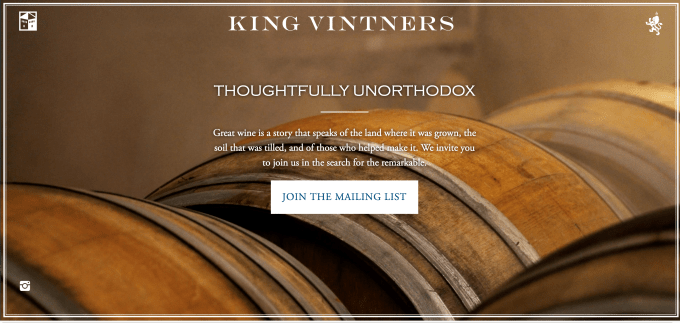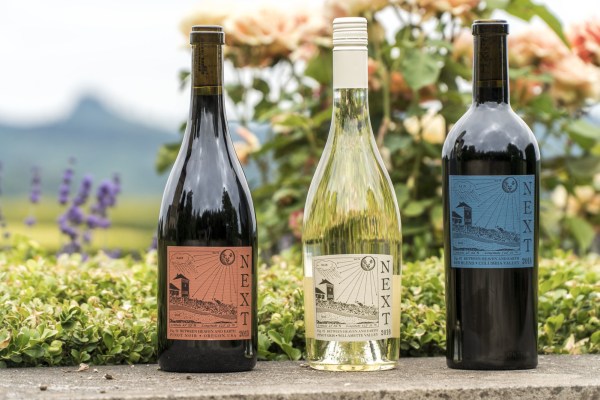According to numerous reports out this morning, Amazon entered the wine business with its own label in partnership with Oregon’s King Estate Winery, which has launched a direct-to-Amazon wine label called “Next.” But that’s not actually the case, as it turns out. Amazon confirmed with TechCrunch that Next wines are not owned by, nor were they developed in partnership with King Estate, and that Amazon did not collaborate with the winery on their creation.
The confusion seems to stem from a press release from King Estate, which refers to the new brand as the “first wine ever developed from conception to release with Amazon Wine” – something that seemed to imply a partnership of sorts was in effect.
That wouldn’t have been a surprising move on Amazon’s part, had it been true. The retailer already offers a number of own-label brands on its site, ranging from batteries to baby wipes, from mens’ dress shirts to clothing to nutritional supplements, and more. Offering consumers a quality wine at a reasonably priced $20 and up per bottle would not have been a stretch, and would fit in with a larger agenda of being the exclusive home to products you can’t get elsewhere.
However, it’s wasn’t entirely clear that King Estate Winery’s new division, King Vintners, was in collaboration with Amazon, as some had inferred.
An Amazon rep clarified their relationship – or rather, the lack of one – with TechCrunch.
“Next is not owned nor developed by Amazon,” an Amazon spokesperson told us. “The wine is owned and developed by King Estate it and can be purchased on Amazon Wine. Amazon’s role is to give wineries, like King Estate, an innovative format to launch new brands and reach more customers,” they said.
Amazon did not work with the winery on the development, we understand, nor did it share sales data that would have enabled King Estates to make determinations about things like which types of wines to sell, or price points.
However, there is something unique about the new Next wine – it’s the first label to be sold directly on Amazon Wine. The only other way to buy Next bottles is directly from King Estates itself via its website, Kingvinters.com, but this is not yet live. Next wines, in other words, won’t pop up on stores shelves out in the real world, for the time being.
That does speak to the power of Amazon’s marketplace in reaching customers – a winery so believes in the potential for direct to consumer e-commerce sales that it’s developing a brand largely to be sold on Amazon Wine itself.
According to the announcement from King Estate, the new King Vintners division will focus on showcasing distinctive Pacific Northwest growing regions. Next, which launched on June 28th on AmazonWine.com, is the first of five brands that will emerge from the division.
The press release also indicates that the decision to launch the wine was driven largely by the younger members in the King Estate family business.
“King Vintners represents an evolution in the King family’s wine enterprise – a ‘next’ generation look at wine by an old wine family,” said Ed King III who, with his father, the late Ed King, Jr., founded King Estate in 1991, in a statement. “Now another generation of the family begins its chapter of the story. Much of the drive for NEXT comes from younger King Estate family and staff – our work family.”
The debut collection of wines includes a $20 Pinot Gris, $30 red blend, and $40 Pinot Noir. Its initial production run will include 1,500 cases of each varietal.
That’s not anywhere near as cheap as something like Trader Joe’s Two-Buck Chuck, but those looking for everyday table wines under $10 already have a sizable collection to browse through via the Amazon Wine website. If anything, the pricing points to the Next brand targeting the wine enthusiast – someone looking for a good bottle and willing to pay a bit more.
Already, Amazon is promoting the new Next label with a big banner on the top of its Amazon Wine homepage – another signal that had initially seemed to imply there was larger deal in place.

While Amazon didn’t help create or collaborate on the wine’s development, it will likely benefit from its launch. Having a unique wine collection on its site could potentially attract more customers, the way that any exclusive would. (And it is currently exclusive to Amazon, given that the winery hasn’t yet launched its own e-commerce sales site – something King Estate will do “eventually,” it said.)
Amazon will also benefit from being able to track the sales around the Next wines themselves. That would allow it to see if launching a direct-to-consumer wine on Amazon.com is something that would make sense for it do in the future – perhaps in partnership with a brand like this, or as a white label product, as retailers sometimes do. That could still come to pass in the future, if Amazon determines it’s worth the investment, but it’s not the case today.
